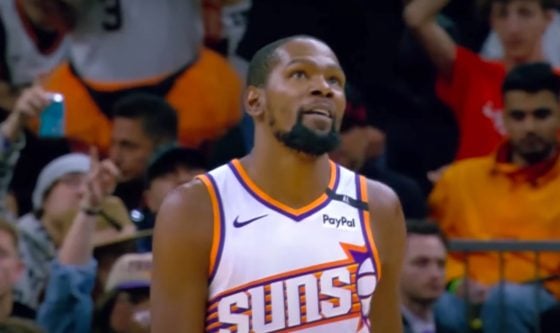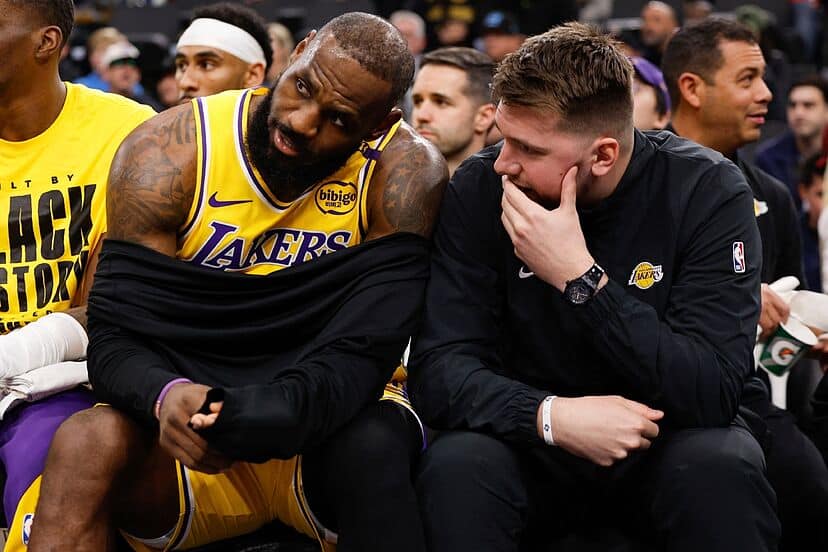This is Part II in a series previewing the Celtics’ likeliest challengers to the throne. Part I, the New York Knicks, can be found here.
Like the too-old kid at summer camp jumping off the high diving board, the Philadelphia 76ers made the splashiest move of the summer, revamping their entire roster around a new Big Three in Joel Embiid, Tyrese Maxey, and Paul George. Will it be enough to challenge Boston for the throne? Spoilers: no.
I’m not a believer in the Big Three model anymore. The NBA has become hyper-optimized; the playoffs are about attacking weaknesses. It’s far more important to be balanced on both ends than to have a high concentration of top-shelf talent with a less than stellar supporting cast.
The 76ers have added some nice role players for cheap, as we’ll discuss below, but we said the same thing about the Phoenix Suns last year. They proceeded to embarrass themselves in the first round despite having all three tentpole stars healthy(ish).
Health, of course, is the most crucial factor for the 76ers. We’ve rarely seen a healthy Joel Embiid in the playoffs, and Paul George is as rickety as a Lincoln flashing 150,000 miles on the odometer. If either is hurt come springtime, the 76ers cease being a threat. But that’s obvious and boring to talk about, so let’s assume they make it to the playoffs intact.
Here is my best guess at the new Philadelphia 76ers depth chart:
PG: Tyrese Maxey, Kyle Lowry, Reggie Jackson
SG: Kelly Oubre Jr., Eric Gordon, Jared McCain
SF: Paul George, Ricky Council IV
PF: Caleb Martin, KJ Martin, Guerschon Yabusele
C: Joel Embiid, Andre Drummond
One thing you’ll note right off the bat is that the 76ers have a bevy of positionally versatile players. Embiid is a center’s center, but nearly everyone on the roster can play at least two and often three positions. We’ll see a lot of Kyle Lowry both next to and in place of Tyrese Maxey. Paul George, Kelly Oubre, and Caleb Martin are all capable of playing two through four.
Philly can’t go huge, exactly, as they lack a true power forward-sized power forward unless former Celtic Yabusele plays a lot more than I expect. But they have a lot of collective length and versatile defenders.
George is the highlight here. The Celtics both clobbered and were clobbered by the Clippers last year in their two games, and while George didn’t exactly explode, he generally shot efficiently. One interesting tidbit: George only had three assists total in those two games, as the Celtics’ ability to stay out of rotation shrunk the passing lanes.
Photo by Jesse D. Garrabrant/NBAE via Getty Images
Boston routinely bullied and beat up Maxey two years ago, but he performed better (if not great) against the C’s last season, showing his overall growth. Maxey’s raw speed is a tough cover for anyone. With George flanking him on the perimeter, Maxey may find even more success getting into the lane.
Embiid is a handful. Boston’s creative defensive schemes have flummoxed Embiid in the past (Jrue Holiday at center, anyone?), but he’s always a threat to break out for 50. Defensively, an engaged and in-shape Embiid is still a monster, shutting off the paint (even if doing so allows Porzingis to roam free on the perimeter).
The rest of the supporting cast looks solid on paper, but there are a lot of question marks. The wheels could fall off of the 38-year-old Lowry at any minute. Eric Gordon was a strong pickup, capable of holding his own defensively while bombing away from way behind the arc. However, at 35 years old, Gordon might fall into irrelevance, too.
Oubre was a pleasant surprise defensively last season, but he’s never been a good shooter (although he’s always a willing one). Teams became bolder leaving him open on the three-point line last season. He has to be better than 32% from deep to avoid being an offensive liability.
Celtics fans know Caleb friggin’ Martin. He’s probably a little overtaxed as the starting power forward on this team, but he’s a sharpened Swiss Army Knife capable of productive minutes across three positions. Drummond is a useful backup center, but the more he’s on the court in place of Embiid, the better for opponents.
The rookie Jared McCain, Council, and Yabusele are unproven, and Reggie Jackson is washed. Outside of Gordon and Martin, I’m not nearly as high on this team’s depth as many people seem to be.
Strengths
The 76ers project to be a robust two-way team.
They were above-average defensively last season despite fewer than 40 games with Embiid, their anchor. At age 34, Paul George remains one of the league’s best wing defenders. Even if he loses a step, he’ll be a huge upgrade over Tobias Harris. While Philly won’t be a top-five defense, they could easily hover around the seven-to-ten range, especially as an Eastern Conference team.
Offensively, George, Maxey, and Embiid are about as snug a fit as you can find. All three can shoot, pass, and dribble, each playing at a different, complementary tempo. George is one of the deadliest catch-and-shooters in the NBA, and Maxey isn’t far behind. They can both play off of Embiid when he’s in the high post, they can run two-man actions with each other (imagine George picking for Maxey and popping to the three-point line, or an inverted George/Embiid pick-and-roll), and they can get a bucket in isolation.
Embiid continues to evolve. Last year was his best passing season by far (5.6 assists per game), and he averaged a career-best 39% from deep on 3.6 attempts per game. He won the MVP in 2022-23 and was an even more lethal offensive player when healthy last year. Fun fact: Embiid averaged more points per minute than Wilt Chamberlain did when he averaged 50 per game!
Surrounding those three with even semi-decent shooting (paging Eric Gordon) will make for a nearly unstoppable attack. If this team struggles, it won’t be because of the offense.
One point in Boston’s favor: Philly projects to be a free-throw monster next season yet again (they had the league’s third-highest free-throw rate last season), but Boston held them to nearly six fewer free throws than their season average (and that trend held even in the games they played with Embiid). While foul-drawing is a Philly strength, the Celtics’ foul avoidance has proven even stronger.
:no_upscale()/cdn.vox-cdn.com/uploads/chorus_asset/file/25627548/1771546395.jpg)
Photo by Jesse D. Garrabrant/NBAE via Getty Images
Weaknesses
The 76ers project to be a poor defensive rebounding group. Embiid and backup center Drummond pile up rebounds like my toddler stacking matchbox cars, and George is positionally solid. After that, though, there are a lot of undersized players who’ll have to battle amidst the trees to corral a miss. Boston can and should hammer the glass against this Philly team, as offensive rebounds can lead to valuable open three pointers for Boston’s many shooters. The 76ers don’t project to be a hugely transition-oriented team, either, limiting the downside of sending rebounders. Interestingly, Boston struggled to take advantage of this last season, only ranking 22nd in offensive rebounding rate against Philly. I’d expect that number to improve, particularly if Luke Kornet or Neemias Queta replace Porzingis’ minutes.
As we’ve already mentioned, Philly’s other major flaw is depth, particularly at the forward spots. George is great, and Caleb Martin is competent. But after those two, the Sixers need at least one of Council, Yabusele, and KJ Martin to prove playable for 18 minutes per night. I’ve always liked KJ Martin, but he can’t seem to stick anywhere he lands (and his contract may as well have come with a “TRADE ME” bumper sticker). Yabusele looked good in the Olympics but proved unplayable offensively in his brief NBA tenure. Council has shown flashes of a well-rounded skill set, but he played fewer than 300 minutes last year.
Coach Nick Nurse likes to play his best guys big minutes, but this team has many old and/or fragile pieces; some of the young guys will be thrust into a bigger role whether they’re ready or not. Philly needs to get something from the back end of their bench. Don’t be surprised if Daryl Morey executes another trade or two to beef up the forward rotation.
Finally, the Celtics are fortunate that three of their four meetings with Philly happen in February and March, so with luck, Porzingis will only miss one game. For all his strengths, Embiid doesn’t want to guard Porzingis on the perimeter; the unicorn dropped 29 against Philly in the one game they played against each other.
Final Thoughts
There are certainly ways for Philadelphia to make Boston’s life difficult, particularly if Porzingis misses extended time. Embiid’s size and Maxey’s speed are two physical attributes the Celtics have struggled with at times, and George is a good enough offensive player to get buckets even against Boston’s stalwart defenders.
But Embiid is at his worst defensively when the Celtics go five-out. If both teams meet in the playoffs at full health, I’d expect a monster Porzingis series from the perimeter while Holiday and Derrick White take turns feasting on Maxey. Like I said up top, the NBA is about mitigating weaknesses, not sharpening strengths. For all their collective talent, the 76ers will have spots to pick at on both ends. Philly might have a hot night, maybe two. Boston might go cold for a stretch. But the Celtics are more equipped to go after the 76ers than vice-versa, and a relatively stress-free six-game series seems the likeliest outcome.






